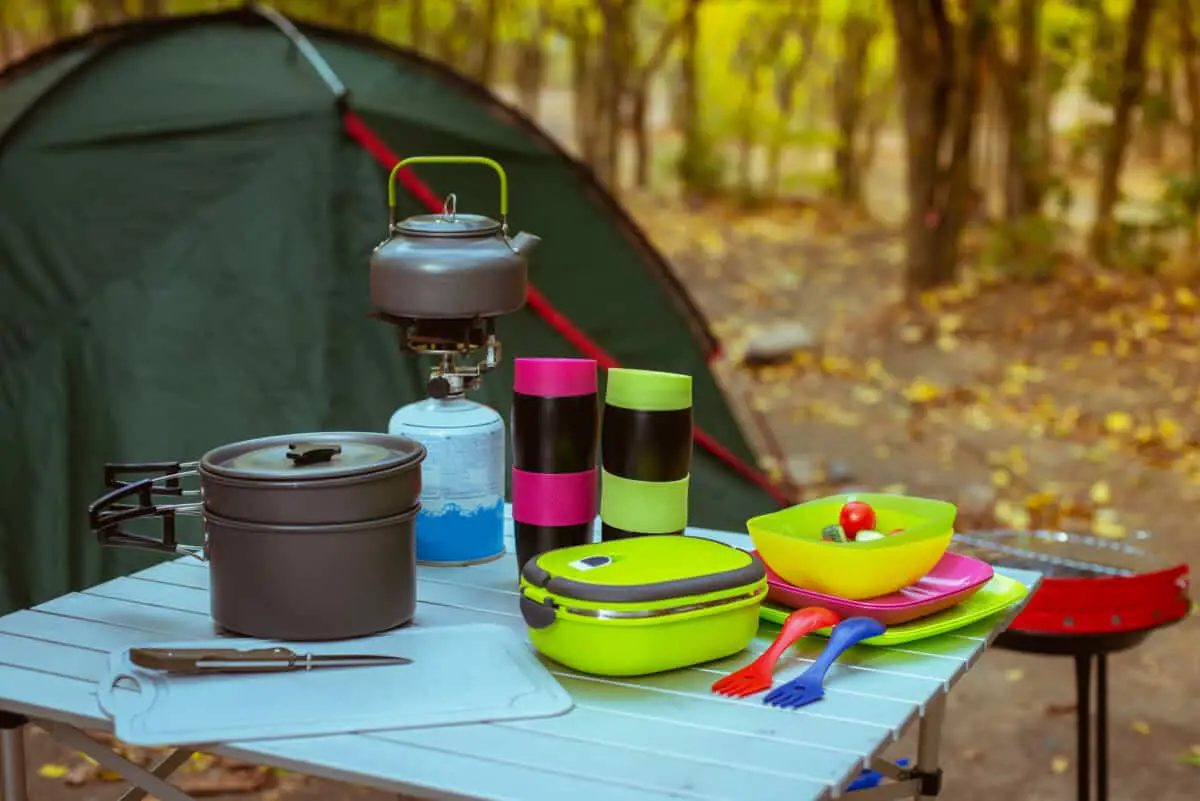Knowing how to prepare your camping cookware before cooking in it will make the cleaning process much easier. To clean your cookware so it will last longer, you should know the type of cookware that you’re using. Always be careful and mindful of the cleaning materials you are going to use as it greatly affects the physical appearance and how long your cookware will last.
Cooking outdoors and away from the comfort of your kitchen can be intimidating. But, who says you can’t bring your kitchen to the wilderness? Check out this article about our top recommendations for the best camping cookware for all budget and sizes.
Cleaning your cookware
Utilizing your cookware using heat leaves burnt food, black tar, and soot sticking on its surfaces. When this happens, most of us directly scrub the pan carelessly, without thinking that not all of the cookware can withstand hard scrubbing.
With such, some pans’ exteriors will have scratches or damages to the layer coating. Scrubbing too hard will shorten the lifespan of your equipment.
These difficulties are commonly experienced, even at home. So, let’s discuss how to clean your cookware by categorizing each type of camping cookware.
Titanium cookware
Before washing it, boil water in your cookware. That will soften the burnt element. After that, remove the pan and add liquid cleaner. Use a nylon dish scrubber to gently scrub off those black components.
If there are residues left, boil water in your pan again. It will also serve as maintenance to sustain its titanium layer. For black tar, put an enormous amount of table salt in the pan, then clean it using a cloth and lemon juice.
Cast iron cookware
Spread sea salt, then scrub it with a soft scrubber or cloth. This type of cookware is vulnerable to scratches so be careful of the cleaning material you are using. Continuous scrubbing with paper towels drizzled with cooking oil can remove black tars.
Stainless steel cookware
Boil water and baking soda together in the pan for 30 minutes. Remove the pan from the heat, then leave it for another half hour. We advise you to use a non-abrasive cloth to remove the burnt elements. Finally, soak it with water and a bit of biodegradable soap to remove black tar or soot.
Enamel cookware
Alike with stainless steel cookware, boil water with baking soda, then remove the burnt material. For black soot, however, just immerse the pan in water and soap.
Aluminum cookware
Steep the pan in water and baking soda with any biodegradable soap for a few minutes. Another way to remove burnt elements is to simmer vinegar in your pan for about 14 minutes.
As for other cookware, use a soft dishwashing cloth to clean the pan. However, use a stain remover for aluminum with vinegar to remove black tars and soot from your pan.
Avoid forcing to remove burnt food with hard scrubs, especially if the materials used to coat your cookware is not capable of withstanding intense cleaning.
Aside from your cookware, you also need to wash your dishes. Without a sink or a dishwasher, sometimes even running water, washing your dishes while you’re out camping can be a bit challenging. To do this chore properly, we have a few tips and tricks on how to wash your dishes while camping that you can follow.
Preparing your camping cookware before cooking
Apart from the methods to remove burnt food, black tars, and soot, you should be wary of the way you use your cookware. There are also methods to prevent these negative effects on your pan. That will reduce your struggles in removing those stains after using your cooking equipment.
-
Avoid burning your food
Clearly, this is the most prudent practice to prevent stains in your pan. But bear in mind that no matter what food you are going to cook or how you cook it, there will always be a bit of stain or food residue left in your cookware.
This may not be visible on top of the pan, but it will be on its exterior surfaces. And yes, preheating oil or boiling your food will alleviate the apparition of black elements. We suggest you cook in low heat, then monitor your food to fend off the cause of burnt food.
-
Cook in freezer bags and camping stoves
Using freezer bags can avoid burnt stains on your cookware because the food will not be in direct contact with the surface of your pan. All you need to do is place your food inside the freezer bag, then boil it in the cookware. Although we can’t assure you that all kinds of food can be cooked with this method, you will be able to cook easy-to-prepare food, like eggs, vegetables, and fish, for instance.
Another suggested technique is to cook using camp stoves. Doing so can prevent stains or permanent discoloration of your pans. Note that different kinds of woods can greatly affect the appearance of black tars.
-
Put dishwashing soap
You can do this, but not inside the pan in which you will be cooking your food. Instead, coat the outer parts of your cookware with a small amount of dishwashing soap. It works as a barricade to prevent black tar and soot. The cleaning process after this will be easier.
-
Use titanium or cast iron cookware
Although cast iron cookware is quite expensive, it is durable and the quality is impressive. Apart from this, this type of cookware also provides a nonstick surface, which is best to utilize to avoid stains caused by burnt food.
The same goes for titanium cookware. They are lightweight, sturdy, and nonstick.
Tips to wash your dishes while camping
There are many ways of washing your cookware while you’re out camping. Being cautious of the dishwashing soap and scrubs you are using is just the primary way of the washing routine you should adopt if you want to maintain the performance of your cookware.
Let’s tackle more in this area.
- Some people tend to only clean the top portion of their pans or the inside of their pots without minding the exteriors. However, we prefer to clean them thoroughly and never leave any bits of food leftover and burnt coating on the bottom part of your pan. Doing so helps take care and sustain the materials instilled by the manufacturer on the cookware.
- Another tip for you to reuse the water you used to clean the cookware is to strain while pouring it to storage. You can use this water to clean your equipment as long as it is still clear and not oily.
- The use of environment-friendly cleaning materials is recommended as well. We’re not just focusing on how we wash our dishes, but also on reducing the pollution of the surroundings caused by the waste coming from campers’ cooking. Therefore, we advise you to use biodegradable soaps.
- To maintain proper hygiene, even if you don’t have any dishwashing stuff, hot or boiled water can lend you a hand in disinfecting and washing your dishes.
- Use appropriate dishwashing scrubs and sponges on your cookware. As mentioned earlier in the Cleaning Your Cookware section of this article, some types of cookware cannot withstand hard scrubs or extreme cleaning. Thus, we suggest you prepare adequate dishwashing materials.
- Lastly, if you don’t want to clean your dishes while you’re camping, you can carry them along with you by covering them with plastic. This technique is only possible if you are going to cook once during your trip because if you reuse your cookware without cleaning it beforehand, bacteria may form and it will be hard to clean the next time you cook.
Final thoughts
Sometimes we experience some difficulties and negative results on the equipment that we use because we lack the knowledge that each of the cooking materials require to be maintained in order to last longer.
You should prioritize the cleaning process and routine after you cook to avoid further issues that may develop in your pans and pots, such as ineradicable stains. Be aware of the cleaning materials you utilize to clean the surfaces of the cookware that are used to cook your food, because the wrong materials may damage your pans or scratch them.
We really admire the nonstick feature of cast iron and titanium cookware. Aside from being lightweight, such cookware ensure that your food won’t stick on the pan. These features are part of the reasons why we prefer cast iron and titanium cookware for our camping gear ensemble.

